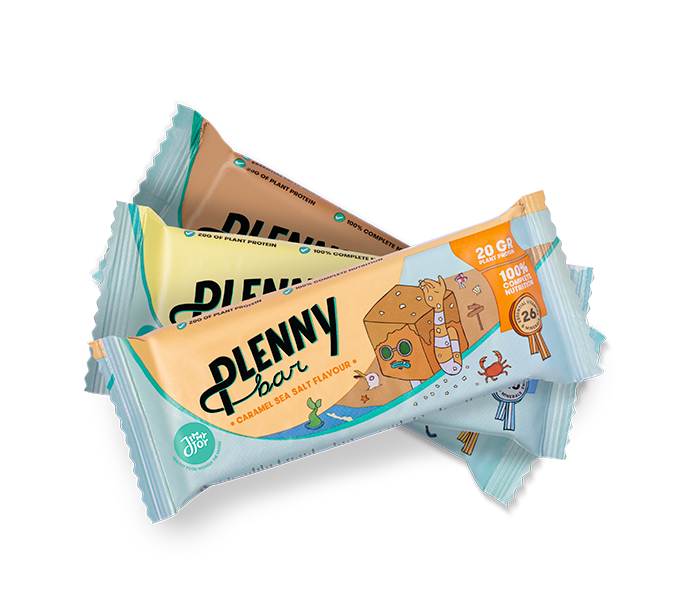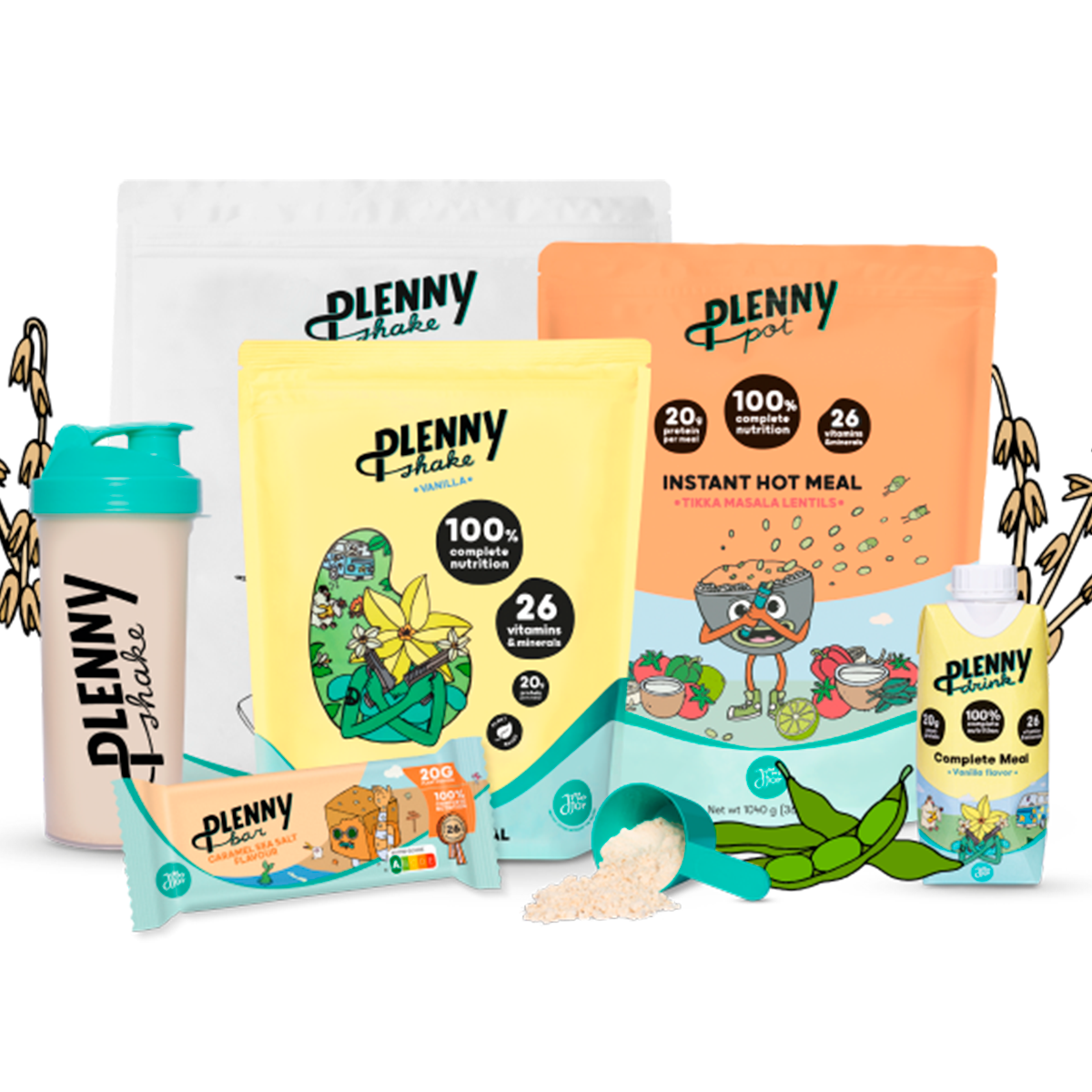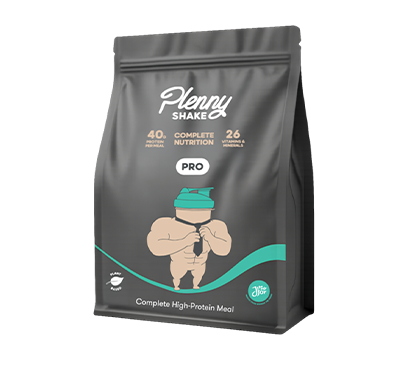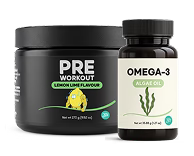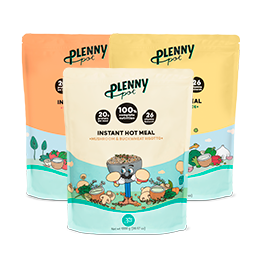Introduction to Plenny Pot v1.0

Plenny Pot is a healthy, convenient, nutritionally complete instant hot meal that is balanced in nutrients (high in protein, 100% plant-based, a source of fiber, and low in sugar). It also contains probiotics and prebiotics for a healthy gut. We top it off with our high-quality blend of 26 essential vitamins and minerals that your body needs to stay healthy.
Plenny Pot is our first product that can be enjoyed hot! Just add boiling water, wait a bit and enjoy an instant hot and nutritious lunch or dinner!
Plenny Pot comes in 5 different delicious meals: Creamy Cajun Pasta, Tikka Masala, Vegetable Korma Rice, Satay Noodles and Buckwheat Risotto with Mushrooms. They provide you with 400 calories of which 20% come from protein, 25-29% from fat, 45-52% from carbohydrates and 3-6% from fibre, depending on the flavour.
Did we pique your curiosity? Read on to find out more!
Macronutrients
• Proteins
• Fats
• Carbohydrates
Micronutrients
Nutritional Breakdown
|
Per serving (300g) |
Creamy Cajun Pasta v1.0 |
Tikka Masala Lentils v1.0 |
Vegetable Korma Rice v1.0 |
Mushroom Risotto v1.0 |
Satay Noodles v1.0 |
|||||
|
Nutrition |
Worth |
%RI |
Worth |
%RI |
Worth |
%RI |
Worth |
%RI |
Worth |
%RI |
|
Energy |
400 kcal |
20% |
400 kcal |
20% |
400 kcal |
20% |
400 kcal |
20% |
400 kcal |
20% |
|
Protein |
20 g |
40% |
20 g |
40% |
20 g |
40% |
21 g |
41% |
20 g |
40% |
|
Fat |
13 g |
19% |
12 g |
17% |
11 g |
16% |
13 g |
19% |
12 g |
19% |
|
Of which saturated fats |
2.1 g |
11% |
4.5 g |
23% |
3.1 g |
16% |
4.6 g |
23% |
2.7 g |
14% |
|
Carbohydrates |
45 g |
17% |
50 g |
19% |
52 g |
20% |
47 g |
18% |
46 g |
18% |
|
Of which sugars |
11 g |
12% |
10.9 g |
12% |
5.2 g |
6% |
7.9 g |
12% |
7.4 g |
8% |
|
Fibers |
12 g |
8.9 g |
6.5 g |
6.3 g |
6.5 g |
|||||
Ingredients
|
Creamy Cajun Pasta |
Tikka Masala Lentils |
Vegetable Korma Rice |
|
|
|
|
Macronutrients
Proteins
Proteins are essential in your diet, they are the building block of essential compounds in your body and give your body its structure. Since we cannot do without this nutrient, each serving of Plenny Pot provides 20 grams of protein so that you reach the recommended daily intake. You can read more about how much protein you really need here ! A Plenny Pot meal, which is rich in protein, can make you feel more satiated during the day because proteins take longer to digest than carbohydrates. The main protein sources of the product are soy and pea protein . In addition, the black beans added to the Tikka Masala also contribute to its protein content. Do you want to read more about vegan protein sources? Read this article ! (1,2)
Fats
Most of the fats in Plenny pot come from sunflower oil. Sunflower oil has mostly monounsaturated fats and a high amount of omega-6 and omega-3. Your body cannot produce these omega-3 and omega-6 on its own; which is why it must be present in your food. Since we don't want to be beholden to omega-3, we also add flaxseed due to its high content of α-linolenic acid (omega-3) and linoleic acid (omega-6). Lastly, coconut milk adds to the total fat content. Coconut milk is often frowned upon due to its saturated fatty acids. However, Plenny pot has a saturated fatty acid content of between 2.1 – 4.5 grams, well below the recommended upper limit of 10% E. Additionally, coconut milk consists of medium chain triglycerides (MCTs), which ongoing research suggests have a positive effect on weight loss, fat loss, energy burning, and improving the gut environment (3–11).
Carbohydrates
Carbohydrates are a nutrient that provides your body with glucose, the main source of energy for the brain (8). The group of carbohydrates can be divided into categories such as sugars and starches, which provide you with this essential nutrient. The Institute of Medicine (IOM) has set a required daily intake of 130 grams per day for adults to provide this fuel to the brain (9). Plenny Pot contains 45-52 grams of carbohydrates per meal, making a diet based solely on this meal provide you with a sufficient amount of this nutrient. The carbohydrates present in Plenny Pot are a combination of complex and easier to digest. More specifically, white rice, glucose syrup, and maltodextrin are added and work as an immediate form of energy. To provide long-lasting energy and prevent a sugar spike or crash, some complementary sources have been added: Tikka Masala and Vegetable Korma rice varieties contain potato starch, which is a resistant starch that works as a fermentable fiber. Creamy Cajun pasta and satay noodles contain whole grains, which also contribute to slower digestion and increased blood glucose. Resistant starch has been shown to improve insulin sensitivity and reduce blood glucose levels after meals. Additionally, it feeds beneficial bacteria in the gut and contributes to a healthy gut environment.
Fibers
To smooth out your digestive system, some additional fibers have been added to Plenny Pot in amounts of 6.5-12 grams per serving. This amount is based on recommendations from authorities such as the Dutch Health Council and the American Heart Association, which define 30-40 grams of fiber per day or 25 grams of fiber in a 2000 calorie diet (15,16). The main sources of fibers in Plenny Pot are chicory root fiber, whole grain pasta, potato starch, flaxseed, and legumes. They help lower blood pressure and smooth digestion. In particular, chicory root fiber is added to achieve a wider variety of fiber sources and improve the number of fibers per serving. This results in Tikka Masala Rice, Mushroom Risotto , Satay Noodles, and Vegetable Korma Rice being a source of fiber and Creamy Cajun Pasta being high in fiber. (12,20-22)
In addition, probiotics are added due to their ability to improve and possibly strengthen our gut microbiome. Probiotics have a symbiotic effect with the high fiber content of Plenny Pot. This means that the probiotics become more resistant and provide a stronger health effect thanks to the fibers they eat and live on. You can read more about gut health in this article (23).
Micronutrients
The blend of vitamins and minerals we add to the product provides all 26 necessary micronutrients. We use the most bioavailable forms of the micronutrients so that your body can absorb each serving of all the vitamins and minerals easily and at the highest rate. For example, we add vitamin D in the form of cholecalciferol (D3) and vitamin K in the form of menaquinone-7 (K2 MK7). You can read more about our micronutrient blend here .
It is said that vitamins can be degraded by heat, so to ensure we are giving you the correct amounts, excess amounts have been included in the formula to account for this loss. Excess amounts can range from 20-50% depending on the vitamin. Minerals, however, are not affected by heat.
In addition to the nutritional benefits of Plenny Pot, they get their flavor from a bunch of spices and dried vegetables. Can't wait to try our first tasty product? Order yours here !
|
Vitamins and minerals |
A portion |
RI%* |
|
Vitamin A |
160 μg |
20%* |
|
Vitamin D |
5.0 μg |
100%* |
|
Vitamin E |
4.0 mg |
33%* |
|
Vitamin K |
16 μg |
21%* |
|
Vitamin C |
40 mg |
50%* |
|
Thiamin |
0.4 mg |
36%* |
|
Riboflavin |
0.3 mg |
23%* |
|
Niacin |
3.6 mg |
23%* |
|
Vitamin B6 |
0.4 mg |
29%* |
|
Folic Acid |
60 μg |
30%* |
| Vitamin B12 |
3.2 μg |
128%* |
|
Biotin |
10 μg |
20%* |
|
Pantothenic acid |
1.2 mg |
20%* |
|
Potassium |
400 mg |
20%* |
|
Chloride |
279 mg |
35%* |
|
Calcium |
185 mg |
23%* |
|
Phosphorus |
140 mg |
20%* |
|
Magnesium |
75 mg |
20%* |
|
Iron |
3.2 mg |
23%* |
|
Zinc |
2.0 mg |
20%* |
|
Copper |
0.4 mg |
40%* |
|
Manganese |
1.0 mg |
50%* |
|
Selenium |
18 μg |
33%* |
|
Chromium |
8.0 μg |
20%* |
|
Molybdenum |
13 μg |
26%* |
|
Iodine |
30 μg |
20%* |
*% of the daily reference intake (RI) of vitamins and minerals
** Reference intake for an average adult (8400 kJ / 2000 kcal)
Sources
- Pendick D. How much protein do you need every day? [Internet]. Harvard Health Blog. 2015 [cited 2020 Apr 9].
- St-Onge MP, Jones PJH. Greater rise in fat oxidation with medium-chain triglyceride consumption relative to long-chain triglyceride is associated with lower initial body weight and greater loss of subcutaneous adipose tissue. Int J Obes Relat Metab Disord J Int Assoc Study Obes. 2003 Dec;27(12):1565–71.
- Baba N, Bracco EF, Hashim SA. Enhanced thermogenesis and diminished deposition of fat in response to overfeeding with diet containing medium chain triglyceride. Am J Clin Nutr. 1982 Apr;35(4):678–82.
- Dulloo AG, Fathi M, Mensi N, Girardier L. Twenty-four-hour energy expenditure and urinary catecholamines of humans consuming low-to-moderate amounts of medium-chain triglycerides: a dose-response study in a human respiratory chamber. Eur J Clin Nutr. 1996 Mar;50(3):152–8.
- Rial SA, Karelis AD, Bergeron KF, Mounier C. Gut Microbiota and Metabolic Health: The Potential Beneficial Effects of a Medium Chain Triglyceride Diet in Obese Individuals. Nutrients [Internet]. 2016 May 12 [cited 2020 Oct 26];8(5).
- St-Onge MP, Bosarge A. Weight-loss diet that includes consumption of medium-chain triacylglycerol oil leads to a greater rate of weight and fat mass loss than does olive oil. Am J Clin Nutr. 2008 Mar;87(3):621–6.
- St-Onge MP, Mayrsohn B, O'Keeffe M, Kissileff HR, Choudhury AR, Laferrère B. Impact of medium and long chain triglycerides consumption on appetite and food intake in overweight men. Eur J Clin Nutr. 2014 Oct;68(10):1134–40.
- Balić A, Vlašić D, Žužul K, Marinović B, Bukvić Mokos Z. Omega-3 Versus Omega-6 Polyunsaturated Fatty Acids in the Prevention and Treatment of Inflammatory Skin Diseases. Int J Mol Sci [Internet]. 2020 Jan 23 [cited 2020 Aug 28];21(3).
- Boston 677 Huntington Avenue, Ma 02115 +1495‑1000. Types of Fat [Internet]. The Nutrition Source. 2014 [cited 2020 Apr 9].
- WHO | Fats and fatty acids in human nutrition [Internet]. WHO. World Health Organization; [cited 2020 Apr 7].
- EFSA. Nutrition claims [Internet]. Food Safety - European Commission. 2016 [cited 2020 Oct 9].
- Englyst HN, Kingman SM, Hudson GJ, Cummings JH. Measurement of resistant starch in vitro and in vivo. Br J Nutr. 1996 May;75(5):749–55.
- Wang X, Brown IL, Evans AJ, Conway PL. The protective effects of high amylose maize (amylomaize) starch granules on the survival of Bifidobacterium spp. in the mouse intestinal tract. J Appl Microbiol. 1999;87(5):631–9.
- Topping DL, Fukushima M, Bird AR. Resistant starch as a prebiotic and synbiotic: state of the art. Proc Nutr Soc. 2003 Feb;62(1):171–6.
- Topping DL, Clifton PM. Short-chain fatty acids and human colonic function: roles of resistant starch and nonstarch polysaccharides. Physiol Rev. 2001 Jul;81(3):1031–64.
- Wong JMW, de Souza R, Kendall CWC, Emam A, Jenkins DJA. Colonic health: fermentation and short chain fatty acids. J Clin Gastroenterol. 2006 Mar;40(3):235–43.
- Jenkins DJ, Wolever TM, Taylor RH, Barker H, Fielden H, Baldwin JM, et al. Glycemic index of foods: a physiological basis for carbohydrate exchange. Am J Clin Nutr. 1981 Mar 1;34(3):362–6.
- Lamothe LM, Lê KA, Samra RA, Roger O, Green H, Macé K. The scientific basis for healthful carbohydrate profile. Crit Rev Food Sci Nutr. 2019 Apr 12;59(7):1058–70.
- Carlson JL, Erickson JM, Lloyd BB, Slavin JL. Health Effects and Sources of Prebiotic Dietary fiber. Curr Dev Nutr [Internet]. 2018 Jan 29 [cited 2020 Sep 2];2(3).
- Medicine I of. Dietary Reference Intakes for Energy, Carbohydrate, fiber, Fat, Fatty Acids, Cholesterol, Protein, and Amino Acids [Internet]. 2002 [cited 2020 Apr 9].
- Whole Grains, Refined Grains, and Dietary Fiber | American Heart Association [Internet]. [cited 2020 Apr 9].
- Holscher HD. Dietary fiber and prebiotics and the gastrointestinal microbiota. Gut Microbes. 2017 04;8(2):172–84.

